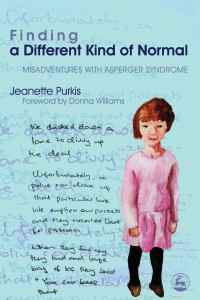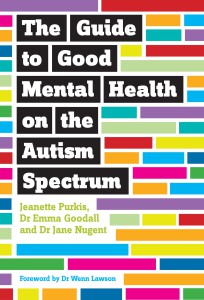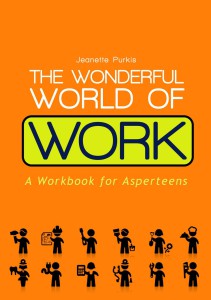 To mark the 10th anniversary of Finding a Different Kind of Normal Jeanette Purkis recalls the events surrounding its publication and the extraordinary effect it has had on her life.
To mark the 10th anniversary of Finding a Different Kind of Normal Jeanette Purkis recalls the events surrounding its publication and the extraordinary effect it has had on her life.
In January 2006 I was a Masters student living in an unpleasant public housing estate with 100 neighbours, many of whom were drug addicts and alcoholics. One of the residents I can only describe as a stalker; I can say this with certainty as she followed me around for years. Despite these surroundings, I was what one might call ‘aspirational’, that is I was an ex-prisoner and fourteen year veteran of welfare benefits who was going to university for one reason – to get a professional job and escape from the drug addicts, alcoholics, and my stalker.
As far as public housing tenants and ex-prisoners go I was an unusual case, insofar as I was about to become a published author. In late 2004 I had the good fortune of meeting autism advocate, creative prodigy and celebrity author Donna Williams who convinced me that I needed to write out my rather-too-interesting life story. From then on she mentored and supported me through the process which resulted in 197 pages of my exceptionally frank life story and then a contract from Jessica Kingsley Publishers – the first publisher I approached with my manuscript. As soon as I found out my proposal was accepted I told everyone that I would soon be a published author (I even tracked down my rather bemused high school art teacher who I hadn’t seen since 1991). My enthusiasm was matched only by that of my dad who I once observed telling the cashier in a shop (who I’m fairly certain he didn’t know) about my upcoming author-ing. Suddenly my life seemed to be headed towards my aspirations.
The publicity for the book was fascinating. I was interviewed on the BBC Woman’s Hour radio program which involved a chauffeur picking me up from ‘the block’ and
driving me to salubrious South Melbourne where I was interviewed remotely from the UK at the Melbourne studios of the Australian Broadcasting Corporation. The most exciting thing about my book though was not the novelty, the media attention or the parental bragging rights, but the change in my self-perception. My autobiography did not make me famous or wealthy, but it did something incredible in that it helped to banish my self-doubt and negative perceptions of myself. A published author was surely a good thing to be. When I saw myself after the book came out, I didn’t see the criminal or drug user of my past, I didn’t see a public housing tenant or someone who had been so long on welfare benefits that statistics classified me as ‘outside of the labour force’, instead I saw an author. I have loved books for as long as I can remember, and as a child the characters in novels and their creators were good friends who taught me a lot about how humans operate. Now I had joined the ranks of my publishing heroes and heroines, it is an understatement to say I was excited, Whenever I was in a book shop I would check the shelves and be delighted when I found my little literary creation sitting there happily amongst the smattering of other titles about autism. Three months after the book was released I applied for two professional jobs. I had never
applied for professional jobs before but I was successful in my first attempt and subsequently moved to Canberra to join the Australian Public Service.
The book also opened doors in the autism world. Donna Williams introduced me to autism advocacy and public speaking and I started doing some talks for high school students and teachers. I was also asked to participate in a documentary about the lives of four adults on the autism spectrum. This aired nationally and to this day I am still recognised by people on buses and planes because of it. Before I wrote the book I had trouble disclosing my Asperger’s diagnosis and was quite uncomfortable with it but writing a book focused on my autism that published internationally forced me to accept my diagnosis. As an autistic author I had something to say about autism and there were people who expected that to be interesting, this was terrifying and exhilarating at the same time!
So what am I doing now, ten years after Finding a Different Kind of Normal was published? I still work for the Australian Public Service; I have been promoted twice and do a lot of work around disability advocacy within my workplace, such as co-chairing the department’s Ability Network. I own my own home, a homely apartment that I like to call Whimsy Manor (that contains over 250 artworks on display at last count). My autism world profile is currently taking off a little bit and people tell me intriguing but confusing things such as ‘you’re Australia’s version of Temple Grandin’. I speak at conferences around Australia and overseas, I did a presentation at TEDx Canberra and recently spoke at an event with Professor Grandin; the highlight of my advocacy career thus far.
My second book was published in 2014, The Wonderful World of Work: A Workbook for Asperteens, and my third (a collaborative work on autism and mental health entitled The Guide to Good Mental Health on the Autism Spectrum) is due for release shortly. I am a regular blogger, facilitate a support group for autistic women in Canberra, I have a weekly internet-based radio show and I have written guest blogs, articles and web content for a variety of organisations. I am on the board of two autism associations and am an ambassador for three more. All this started with Donna Williams saying “you need to write your life story Jeanette” and me replying “Yeah, why not”.
The publication of Finding a Different Kind of Normal was probably the most pivotal moment in my life and 10 years on people tell me it is still a pretty good read.
Jeanette Purkis is the author of Finding a Different Kind of Normal & The Wonderful World of Work: A Workbook for Asperteens both of which are available from the Jessica Kingsley Publishers website. Her next book The Guide to Good Mental Health on the Autism Spectrum is published in March 2016 through Jessica Kingsley Publishers

